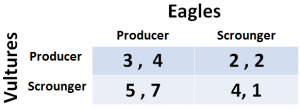Eagles vs Vultures : A Showcase of Producer–Scrounger Dynamics
This article discusses the underlying feeding behavior of two bird species, vultures versus eagles, and explores their evolutionary reinforcements using a game-theoretic model. The coexistence of these two carnivores inevitably leads to resource niche partitioning. As a result, interactions between the vulture and the eagle have led to the possibility of social information transfer between the two species. It has been observed that when one party grounds prey, the other party will follow to the scene soon after. Furthermore, it has been noted that eagles are more efficient at finding carrion, due to their evolutionary feats of speed, far-farsightedness, and powerful beaks. Vultures, on the other hand, are inefficient scouters (due to their large size, they cannot fly lengthy distances) and have weaker beaks (they cannot tear through the hide of carcasses). In this situation, the two avian species have what the literature refers to as a producer–scrounger game. This relationship exists typically when one party provides some kind of resource (information, product, food, etc.), while the other party picks off and consumes the provided resource. The vultures are evidently the ‘dominant’ species (size, pack, aggressiveness), and therefore they are able to favor scrounging, whereas the eagles have their best interest as producers.
This case can be simplified into a game theory model. There are two parties: Vulture and Eagle. There are also two strategies: Producer and Scrounger. If both Vulture and Eagle take on the role as a Producers, the former will have to face fatigue along with competition, and the latter will have to face competition with the larger species vulture (eagles lose to vultures overall). If both Vulture and Eagle take on the role as Scroungers, the two will have to face competition with each other. If the Vulture is the Scrounger and the Eagle is the Producer, the Vulture will be able to conserve energy while the Eagle will have an exclusive share of the resource by arriving first (a ‘finder’s fee’). Finally, if the If the Vulture is the Producer and the Eagle is the Scrounger, the Vulture will face fatigue while the Eagle will have to face competition in order to eat. This model is provided in the example below (Note: The numbers are arbitrary. The emphasis is their proximity to one another)
This model bears similar resemblance to the Hawk-Dove game, in which when both parties compete for the same role (example, Producer/Producer or Scrounger/Scrounger) both are affected negatively. It is advantageous for the Eagle to play as a Producer so that it minimizes its competition and also benefits off the ‘finder’s – fee’. It is advantageous for the vulture to play as a Scrounger so it can minimize its level of fatigue. Therefore, the dominant strategy of this game (Scrounger, Producer), in which both parties can maximize their gains.
http://rspb.royalsocietypublishing.org/content/281/1793/20141072.full

